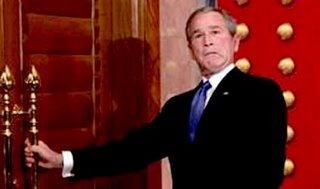Larry, Curley or Moe?

More and more comes out that suggests that Festus hasn't come clean with us from the beginning
Ten days after the September 11, 2001, terrorist attacks on the World Trade Center and the Pentagon, President Bush was told in a highly classified briefing that the U.S. intelligence community had no evidence linking the Iraqi regime of Saddam Hussein to the attacks and that there was scant credible evidence that Iraq had any significant collaborative ties with Al Qaeda, according to government records and current and former officials with firsthand knowledge of the matter.
The information was provided to Bush on September 21, 2001 during the "President's Daily Brief," a 30- to 45-minute early-morning national security briefing. Information for PDBs has routinely been derived from electronic intercepts, human agents, and reports from foreign intelligence services, as well as more mundane sources such as news reports and public statements by foreign leaders.
One of the more intriguing things that Bush was told during the briefing was that the few credible reports of contacts between Iraq and Al Qaeda involved attempts by Saddam Hussein to monitor the terrorist group. Saddam viewed Al Qaeda as well as other theocratic radical Islamist organizations as a potential threat to his secular regime. At one point, analysts believed, Saddam considered infiltrating the ranks of Al Qaeda with Iraqi nationals or even Iraqi intelligence operatives to learn more about its inner workings, according to records and sources.
The September 21, 2001, briefing was prepared at the request of the president, who was eager in the days following the terrorist attacks to learn all that he could about any possible connection between Iraq and Al Qaeda.
The highly classified CIA assessment was distributed to President Bush, Vice President Cheney, the president's national security adviser and deputy national security adviser, the secretaries and undersecretaries of State and Defense, and various other senior Bush administration policy makers, according to government records.
The Senate Intelligence Committee has asked the White House for the CIA assessment, the PDB of September 21, 2001, and dozens of other PDBs as part of the committee's ongoing investigation into whether the Bush administration misrepresented intelligence information in the run-up to war with Iraq. The Bush administration has refused to turn over these documents.
Indeed, the existence of the September 21 PDB was not disclosed to the Intelligence Committee until the summer of 2004, according to congressional sources. Both Republicans and Democrats requested then that it be turned over. The administration has refused to provide it, even on a classified basis, and won't say anything more about it other than to acknowledge that it exists.
One reason that Bush, Cheney, and Rumsfeld made statements that contradicted what they were told in CIA briefings might have been that they were receiving information from another source that purported to have evidence of Al Qaeda-Iraq ties. The information came from a covert intelligence unit set up shortly after the September 11 attacks by then-Undersecretary of Defense for Policy Douglas J. Feith.
Feith was a protégé of, and intensely loyal to, Cheney, Rumsfeld, then-Deputy Defense Secretary Paul D. Wolfowitz, and Cheney's then-chief of staff and national security adviser, I. Lewis (Scooter) Libby. The secretive unit was set up because Cheney, Rumsfeld, Wolfowitz, and Libby did not believe the CIA would be able to get to the bottom of the matter of Iraq-Al Qaeda ties. The four men shared a long-standing distrust of the CIA from their earlier positions in government, and felt that the agency had failed massively by not predicting the September 11 attacks.
. . . The vice president's office also showed great interest in their work. On at least three occasions, Maloof said, Samantha Ravich, then-national security adviser for terrorism to Cheney, visited their windowless offices for a briefing.
But neither Maloof nor Wurmser had any experience or formal training in intelligence analysis.
At the risk of getting repetitive here, when is Festus going to pay the price for misleading us into an intractable conflict in Iraq? Recent polls suggest that 68% of us simply don't believe him . . .

<< Home